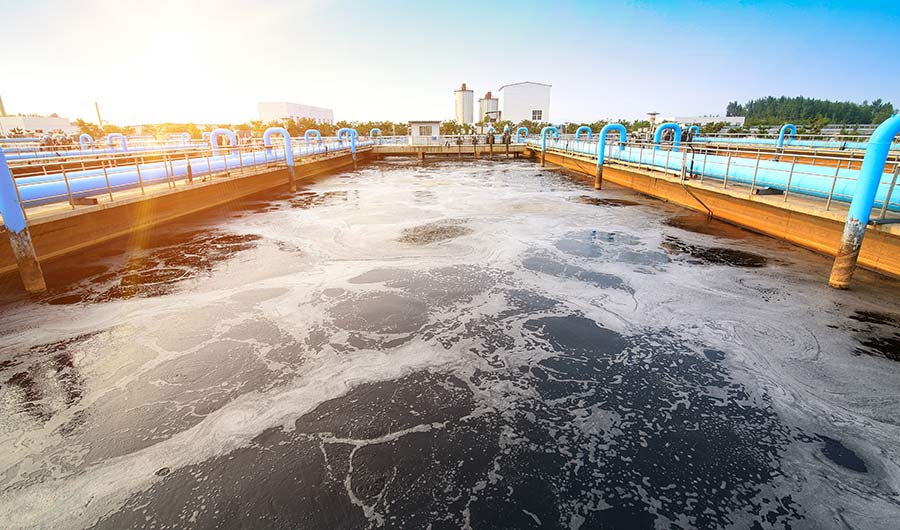Sewage system Introduction.
Sewage system temperature is a critical water quality and environmental parameter because it governs the following.
- Kinds and types of aquatic life.
- Regulates the maximum dissolved oxygen concentration of the water.
- Influences the rate of chemical and biological reactions.
TKN can be reduced through several processes, including gaseous NH3 stripping to the atmosphere, NH3 assimilation into the biomass, biological nitrification/denitrification and sedimentation of insoluble organic N. These processes are affected by temperature, DO concentration, pH value, retention time and wastewater characteristics. Within bottom sediments under anoxic conditions in facultative ponds, denitrification can take place. Temperature, redox potential and sediment characteristics affect the rate of denitrification. In well-designed aerated ponds with good mixing conditions and distribution of DO, however, the effect on the rate of denitrification will be negligible.
Sewage system Temperature Measurement:
Sewage system Temperature is a measure of the average energy (kinetic) of water molecules. It is measured on a linear scale of degrees Celsius or degrees Fahrenheit. It is one of the most important water quality parameters. Temperature affects water chemistry and the functions of aquatic organisms. It influences the:
- amount of oxygen that can be dissolved in water,
- rate of photosynthesis by algae and other aquatic plants,
- metabolic rates of organisms,
- sensitivity of organisms to toxic wastes, parasites and diseases, and timing of reproduction, migration, and aestivation of aquatic organisms.
Sewage system water temperature does not change as fast as air temperature, but because of this, smaller increases in water temperatures can have more of a negative impact on the water quality and ecosystems that depend on this water. Palatability, viscosity, solubility, odors, and chemical reactions are influenced by temperature. Thereby, the sedimentation and chlorination processes and biological oxygen demand (BOD) are temperature dependent. It also affects the biosorption process of the dissolved heavy metals in water
The aesthetic objective for water temperature of Drinking Water Quality is 15°C. This is because most consumers complain about tap water at 19°C or higher. The intensity of taste is greatest for water at room temperature and is significantly reduced by chilling or heating the water. Increasing the temperature will also increase the vapour pressure of trace volatiles in drinking water and, therefore, could lead to increased odour.
HOW WATER TEMPERATURE AFFECTS WATER TREATMENT
When chemical treatment is involved, generally the rates of chemical reactions decrease with decreasing temperature because the temperature dependence of most chemical reactions stems from the activation energy associated with them. The efficiency of one of the key water treatment steps, coagulation, is greatly dependent on temperature. Also, the optimum pH for the coagulation process decreases as temperature increases. Furthermore, as temperature decreases, the viscosity of water increases, and the rate of sedimentation decreases. As a longer settling time is not available in a plant with a fixed flow rate and basin capacity, the efficiency of color and turbidity removal by coagulation and sedimentation may be less in winter than in summer. Due to the stratification of warmer water over cooler water in the treatment basin, very small increases in the temperature (<1ºC) of the raw water source have been reported to decrease the efficiency of the flocculation-sedimentation process. However, appropriate plant and process design can defeat this problem.
Sewage system Temperature affects the power of disinfection, how disinfection slows the growth and impedes the survival of microorganisms. When water has a pH value higher than 8.5, higher temperatures multiply the bactericidal effectiveness of chlorine, as well as its effectiveness in killing some viruses. Some studies have found that the rate of formation of chloroform in raw water treated with a chlorine dose of 10 mg/L multiplied at higher temperatures. Temperature also impacts the coagulation process because it affects the viscosity of the water. Thus, lower temperature waters can decrease the hydrolysis and precipitation kinetics
To design your Sewage Treatment Plant (STP) and to meet all Philippines DENR RA 9275 Clean Water Act, DAO 2016-08 on general effluent Standard contact Avlon. Avlon is one of the best manufacturers and suppliers of sewage treatment plants. It takes care of all the DENR guidelines and serves best quality. For more details contact us or visit our website www.avlon-php.com







